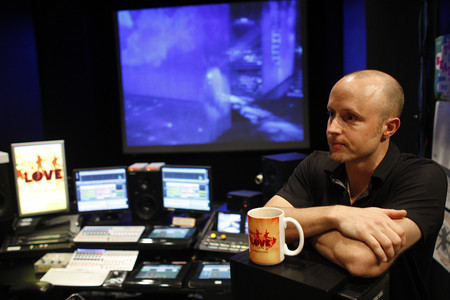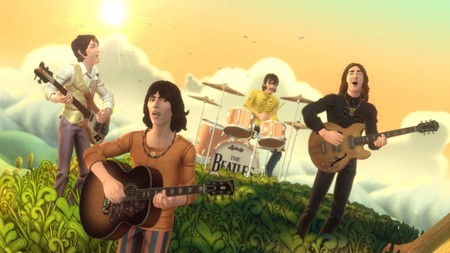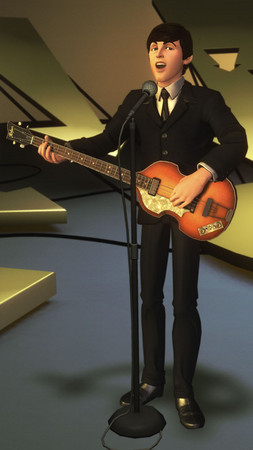Labor of ‘Love’ yields amazing Beatles treasures
At home in his kitchen, John Lennon turned on his audio tape recorder. The tape picked up, in the background, Julian shuffling off to school. John bid Julian goodbye, then began singing a new song called "Strawberry Fields Forever."
Four decades later, Yoko Ono pulled the audio tape out of a closet and handed it to producers and music engineers creating a secret Beatles project called "Love," a Cirque du Soleil show set to open at The Mirage in 2006.
Now it's 2009, and at "Love," between Beatles-inspired acrobatics and aerial feats, 2,000 theatergoers per show hear this audio of John Lennon, from his kitchen, in his arresting and scratchy voice, singing that early stripped-down "Strawberry Fields," easing into their ears from 6,341 speakers in-the-round.
Lennon's simple little "Strawberry Fields" is one of many pleasure gems that came to public being only because of "Love."
At times, the Cirque show also broadcasts previously unheard dialogue recorded between Beatles in the studio.
To prepare for "Love," the entire Beatles catalog was digitally remastered from original 1960s tapes. Of that catalog, "Love" makes use of a few dozen songs, plus snippets from scores more.
Now that whole digitally remastered catalog of Beatles songs is getting released to an international audience.
On Wednesday -- 9/9/09 -- the entire Beatles collection of albums will be rereleased in painstakingly, digitally remastered form, the process that began with "Love" years ago.
At the same time on Wednesday, Electronic Arts releases "The Beatles: Rock Band," perhaps the biggest music video game in history. It too features many digitally remastered Beatles tunes that came about during the "Love" fieldwork.
In the fashion of the music business, the Beatles occasionally come and go in vogue. But this time, the sheer quality of their remastered music could redefine how Beatles fans and audiophiles regard the Liverpool lads' masterworks.
"In time, these remasters will become the definitive statement," the noted music curmudgeon and music industry opinion-setter Bob Lefsetz wrote recently.
"There's nothing in this boxed set that you haven't heard before," Lefsetz told followers via e-mail. "But now, it's come into focus, like someone granted you magic glasses that allowed you to finally see the world."
Lefsetz says the clarity of the remasters at times gives him goose bumps, blows his mind, and makes him feel as if John Lennon were still alive.
"'I Will' sounds like Paul McCartney phoned you up out of the blue, said he was in the neighborhood and could he stop by and play you a few tunes? He's here! This is not music made by a machine, but real human beings."
If you were alive when "Twist and Shout" and its B-side "There's a Place" came out, "you'll cry listening to this album," Lefsetz says.
As for "The Beatles" video game, it is poised to outgross most movies ever made, if you count peripherals for sale.
The game disc, "The Beatles: Rock Band," costs $60 for Wii, Xbox 360 and PS 3, packaged with 45 digital remasters. But any one Beatles "completist" fan could immediately sink up to $750 into the game by buying the limited edition box set ($250); plastic replica Beatles guitars ($100 each); three extra microphones ($15-$50 each) for use in three-part harmonies; and microphone stands ($40); not to mention future downloadable songs at several dollars each.
All this remastered music for CDs and the video game came out of the years' long remastering for "Love," says "Love's" sound pro Gavin Whiteley.
It was a very delicate process, transferring from audio tape to computer nuggets, because over time, the kinds of magnetic audio tapes the Beatles recorded on begins to stick together. If you simply place the tape on a reel and press play, the tape will stick together and rip portions of the sounds off of the tape.
So Beatles music handlers at Apple studios in England placed the tapes in an oven to firm up the tapes. That sounds weird to a layman, but it works.
"The engineers took every tape and baked it," Whiteley says, "meaning they put it in an oven at a certain temperature for a certain time."
Engineers did this for everything -- first takes of songs, second takes of songs, alternate versions, conversations between Beatles -- the band's whole career.
Initially, "Love" benefited greatly. The show features a rare George Harrison acoustic version of "While My Guitar Gently Weeps," and the song is accompanied by a string-section swell that Harrison scored for the show before he died, at his wife Olivia's urging. She thought an orchestra would complement his acoustic take.
Since the Beatles in digital sound in "Love" has been so unique, musicians have requested tours of the booth where Whiteley acts as conductor, as he oversees a massive computer soundboard.
Whiteley and peers at Cirque have given soundboard tours to Mick Fleetwood, Genesis, Steve Perry, Quentin Tarantino and Fergie together (on their joint birthday), the Pussycat Dolls, Shaquille O'Neal, Juliette Lewis, Aerosmith, ZZ Top and Tom Hanks.
"They're interested in seeing what's behind the curtain. And what's behind the curtain is a bunch of computers and touch screens and communication equipment," Whiteley says.
"I did not see George Clooney back here. It might have been my day off."
Paul McCartney toured the sound room, once. Whiteley got him to sign his parents' "Sgt. Pepper's" vinyl album cover. And he asked Sir Paul if he'd take a photo with him.
"Sure," McCartney said. "Why don't you sit on my lap."
"My eyes were open and I had a look like a deer in headlights," Whiteley says. "I didn't know if he was serious, or if there's some sort of penalty for sitting on the lap of an actual knight."
Whiteley decided to just stand next to Paul.
Giles Martin, son of Beatles producer George Martin, also gave top secret "Love" tours to a half-dozen brainiacs from Harmonix/MTV Games, the makers of "Rock Band."
But no one gets to see the room where the digitally remastered songs are stored at "Love." Those remasters are worth tens of millions. And imagine if a DJ, like Danger Mouse, got his hands on digital Beatles tunes that could be separated and respun into bootlegged songs. (Danger Mouse faced Beatles wrath some years ago when he did something just like that.)
So the remasters are stored in a room called "the vault" that's a "physically impenetrable room that we're connected to by some fiber optic lines," Whiteley says.
The soundboard room where Whiteley works is so pivotal to "Love" that a second music technician works next to him, largely to make sure "Love" would not be interrupted if, say, Whiteley stroked out and died during a show.
"Not joking," Whiteley says. "One of the reasons why the other person in that (secondary) chair has been trained to run this is, 'What if I die?'"
Whiteley stresses that safety-obsessed Cirque trains employees for emergency medical situations. But I ask him what would happen if the music of "Love" somehow stopped at the exact moment that Whiteley keeled over. Would a co-worker save him or the show?
"That's interesting. We haven't had that conversation," Whiteley says and jokes, "I wonder what would happen."
Yet another Beatles moment is coming to Las Vegas in a few days. On Friday, classic rock band Cheap Trick is prepping its own tribute to the Beatles, a "Sgt. Pepper's" run-through featuring an orchestra and noted musical conductor Edwin Outwater. That's at the Hilton on Sept. 13-15, 17-19 and 21-23.
Whiteley, originally from Canada, is a keyboard player with a master's degree in music. He used to perform in his own "Sgt. Pepper's" tribute band in Canada.
Whiteley says he knows how difficult it must be for Cheap Trick to replicate the album, with its strings, horns and unusual sounds. It's doable, he says. But "Sgt. Pepper's" is a classic of classics. It has to be done right.
After all, many Beatles fans know every note by heart.
And those fans are everywhere. Whiteley was reminded of that a few years ago, when he and his wife, Kate (a publicist for "Love"), took a boat trip on a tributary of the Amazon, then settled into a lodge.
"Having left a lodge that was completely off the grid, our cook pulled out a flute and started playing 'Hey Jude,'" he says.
"When Kate and I went to Peru in 2007, we traveled thousands of miles. We got to the airport. We took a train to the base of Machu Picchu and, as we got off the train, we heard 'Eleanor Rigby' being played on Peruvian flutes over the train's PA system.
"I thought, "Really? I came all this way and the Beatles are still here.'
"It just makes you realize -- of all the bands in the world, of all the music that transcends culture and generations and language -- the Beatles are it. The song that he knew: It wasn't Elvis. It wasn't Cheap Trick. It was the Beatles."
On Wednesday, as unlikely as it may seem, the Beatles get redefined with a catalog made crystal clear, and with a video game that will touch millions and earn millions more.
Once again, the future of music is what's come before.
Doug Elfman's column appears on Mondays, Tuesdays and Fridays. Contact him at 383-0391 or e-mail him at delfman@reviewjournal.com. He also blogs at reviewjournal.com/elfman.



















